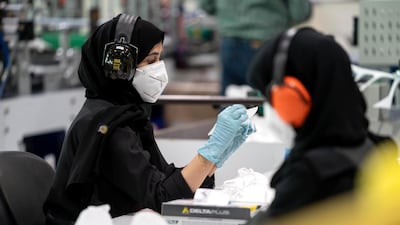The Covid-19 pandemic could redefine global airlines' business models, leading to consolidation among the bigger players, a preference for narrow-body jets and accelerated efforts towards reducing the industry's carbon footprint.
Airlines will start to rely more on single-aisle planes that offer a more economic business case compared to wide-bodies, which is a concern because it has a "direct impact" on aircraft parts maker Strata, Badr Al Olama, executive director of Mubadala Aerospace told the Global Aerospace Summit.
"Airlines are probably going to fly single-aisles, fly older fleet longer and try to avoid making new capital expenditure, so we need to get to a point where we can introduce radical thinking and that needs us to re-invent the airline industry," Mr Al Olama said. "What we need to come up with is new business models that will support those large aircraft to play the role they were designed for."
The global pandemic has devastated the global aviation industry as it brought air travel to a near-halt earlier this year. A recovery in global long-haul air travel, on which wide-bodies are used, is unlikely to return to pre-coronanvirus levels before 2023, the International Air Transport Association said, noting it will be the last part of the industry to recover.
Mubdala Investment Company's aerospace portfolio – which includes manufacturing plane parts, components leasing and engine maintenance services – was "impacted severely" by the pandemic, the executive said.
"It's been devastating and the impact is not only on us but the entire eco-system," Mr Al Olama said.
Strata, which counts Boeing and Airbus among its customers, has seen more than 50 per cent of its revenue wiped out by the impact of the pandemic on the industry, he said. In July, Strata said it registered a 40 per cent decline in its order book for aircraft parts. The company began to diversify into the healthcare sector to produce N95 masks in a partnership with Honeywell.
The pandemic, similar to past crises such as the 9/11 attacks in the US, will bring about changes in security standards in the aviation industry, Tony Douglas, Etihad Airways group chief executive, said in a keynote address during the summit, which is being held online.
Global airlines need to adopt a "harmonised" standard for health measures to ensure that passengers are medically fit to fly as air travel resumes, he said.
"We believe that some form of wellness certification may well come into force," Mr Douglas said.
Iata is calling for Covid-19 testing before departure on international flights as an alternative to government-imposed travel restrictions such as quarantines, which the industry says is denting air travel demand.
Tests that are fast, highly accurate, affordable and easy to administer are expected to be available in October and should be adopted by governments as a globally-accepted standard, the industry body said last week.


